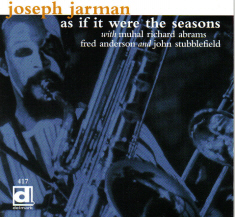Review by Brad Walseth
To be honest, avant garde jazz can sometimes leave me cold, but at it's best, there is something in the freedom and energy that perhaps comes closest to making the music into a true form of art - one that reflects "Life" in all it's tangled beauty of pain and joy. This remixed reissue from Delmark is an absolute trip, and a strong case for what free form avant garde jazz can offer. While certainly not for the faint of heart, "As If It Were The Seasons" is a treat for those inclined for adventure and spirituality in their listening.
Originally recorded in 1968, just before Jarman joined the Art Ensemble of Chicago, this album features the artist (and co-founder of the AACM) on an assortment of reeds: alto and soprano sax, bassoon, fife and recorder. He is joined by the criminally underappreciated rhythm section of Charles Clark on bass and cello koto, and drummer/percussionist Thurman Barker, along with dazzling singer Sherri Scott. The two-part first piece - "As If It Were the Seasons and Song to Make The Sun Come Up," starts off with fairly subdued improvised interplay between the musicians before Scott enters at about the 13 minute mark. The bowed strings, frantic reeds, and assortment of gongs, chimes, blocks, and other sounds set the moody atmosphere, before things pick up 15 minutes into this nearly 24 minute composition. Here Clark and Barker collide like two freight trains, while Scott and Jarman thrust and pierce the upper registers. This is heady and exciting stuff even today - I can hardly imagine what the audiences of 1968 thought upon hearing this.
Jarman's collaborator, the pianist Christopher Gaddy, had died leaving a few bars of music from an unfinished composition - from which Jarman fashioned the second and final piece - "Song for Christopher." On this number, Jarman, Clark, Barker and Scott are joined by six additional musicians in a blowing session of fierce intensity. Pianist Muhal Richard Abrams, tenor saxophonists Fred Anderson and John Stubblefield, along with Joel Brandon on flute, John Jackson on trumpet and Lester Lashley on trombone help create a sound collage that teeters nearly over the edge into insane cacaphony, while retaining the mantle of "Music." While alternating sections of severity with moments of melodic beauty, the song serves in effect as a catharsis for the loss of a loved one. Like a New Orleans funeral march without the trappings of European tonality, this is pure raw emotion - in essence the sound of Grief - mixed with joy as in remembrance, hope for a spiritual voyage, along with despair, sadness and anger at the loss (and indeed at the Afro-American experience itself). Drummer Barker is dynamite, the horns shriek and wail, and Abrams invokes awe with his waves of powerful piano lines. Meanwhile, the remixed sound quality captures the nuances of a group of individuals communicating with each other and holding nothing back. Mind-blowing and worth the trip if you can handle it.
|

